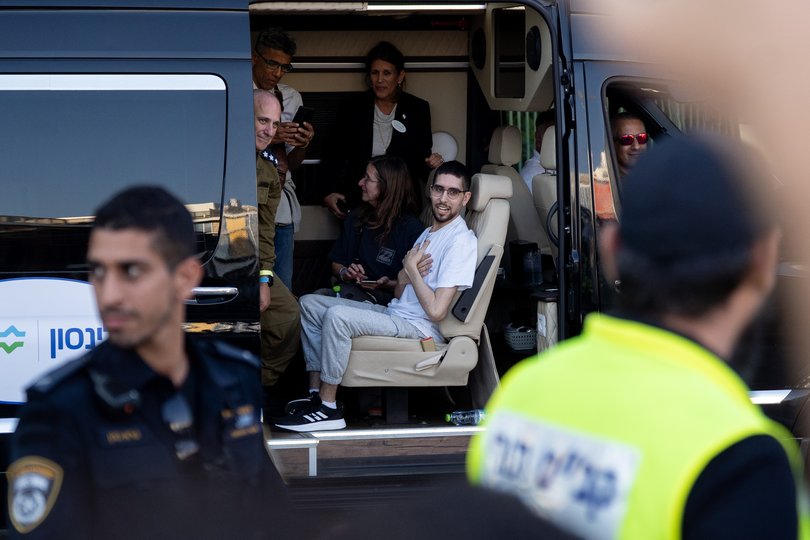DVIR ABRAMOVICH: Gaza hostage release has unshackled the hearts of Israelis
DVIR ABRAMOVICH: A people who had dwelt in fear stepped, trembling, into light. The long night that began on October 7, 2023 was finally broken, its darkness yielding to dawn.
It began with silence, a hush that held Tel Aviv in its tender grip. In the dawn’s soft glow, the city stood still, the sea itself pausing in reverence.
Then, as whispers of the final hostages crossing the border swept through, the city exhaled — its heart unshackled, pulsing with fervent relief.
Screens bloomed with faces no one dared dream would return. Twenty souls — thin, pale, blinking into daylight — stepped into the world’s embrace, each a universe reclaimed from the abyss.
Sign up to The Nightly's newsletters.
Get the first look at the digital newspaper, curated daily stories and breaking headlines delivered to your inbox.
By continuing you agree to our Terms and Privacy Policy.In the square that had cradled their portraits for two years, voices rose in a passionate song. Flags unfurled like declarations of the heart, colours dancing in the wind. Chants swelled and ebbed like waves of longing, singing for those alive and the 28 whose absence ached like a wound.
Among the first was Evyatar David, the young man once a shadow in a Hamas video, gaunt and digging his own grave. Now he stood beneath an open sky, his parents clutching him, their arms a fortress against fear, as if he might slip away again.
Nearby, Noa Argamani and Avinatan Or. Torn apart at the Nova music festival, they clung to each other, their reunion a silent hymn of disbelief and renewal. Words were unnecessary; every gesture sang the same truth: we are still here.

At Beilinson and Ichilov hospitals, the freed began their careful recovery, doctors whispering care in spoons and sips, rebuilding bodies starved by cruelty.
Outside, strangers stood vigil, their flowers and songs a bouquet of devotion. The air shimmered with reverence and release, a testament that what hatred stole, endurance reclaimed.
President Donald Trump’s arrival that morning marked a turning point, yet his presence paled beside the families’ radiant story. His ceasefire deal kindled this hour, but the day belonged to those whose spirits never wavered. His words in the Knesset — “The war is over” — were only an echo of the crowds’ tearful, jubilant cry.
Across Israel, new scenes unfolded. A soldier saluted as helicopters roared above. In apartment blocks, neighbours knocked to share mazel tov, their voices bright with hope. For once, joy’s melody drowned out grief’s sombre refrain.
Far beyond those streets, in Jewish homes across the world, that same joy rippled like a current of connection. In Australia, families gathered, eyes fixed on screens, hearts beating with Tel Aviv’s. Some whispered blessings over morning tea; others stood in silence, faces aglow, their spirits moving in time with a distant city. It was not triumph but relief — the kind that blooms when the world remembers its humanity.
The day wove sunlight with shadow, laughter with lament. At military bases, soldiers bore four flag-draped coffins-the first of the fallen to return.
Twenty-four others remained in Gaza, waiting for their final homecoming. Israel’s joy was fierce yet unfinished, a melody yearning for its closing note.
Still, something unshakable had shifted. A people who had dwelt in fear stepped, trembling, into light. The long night that began on October 7 two years ago had finally broken, its darkness yielding to dawn.
In every synagogue across Australia, in every home where names were whispered in prayer, one truth pulsed: survival is no accident. It is faith’s defiant act of will.
Israel’s story has always been one of return-out of exile, ruin, and the world’s disbelief. This day wove itself into that unending narrative, reminding a weary world that faith — in God or in humanity — is the boldest answer to cruelty.
And perhaps that is why even those beyond Israel’s borders felt the tremor of recognition. To see a mother and child reunited after two years is to witness hope made flesh — a light that burns through despair. It is to know that endurance is not Israel’s alone, but humanity’s shared vow.
As dusk settled, Tel Aviv’s crowds thinned, banners sagging in the night breeze. Yet the light — the stubborn, human light that refuses extinction — remained.
The hostages came home, and with them returned something greater: the unyielding conviction that even after the deepest darkness, light ushers in the dawn.
Dr Dvir Abramovich is Chair of the Anti-Defamation Commission and the author of eight books.
